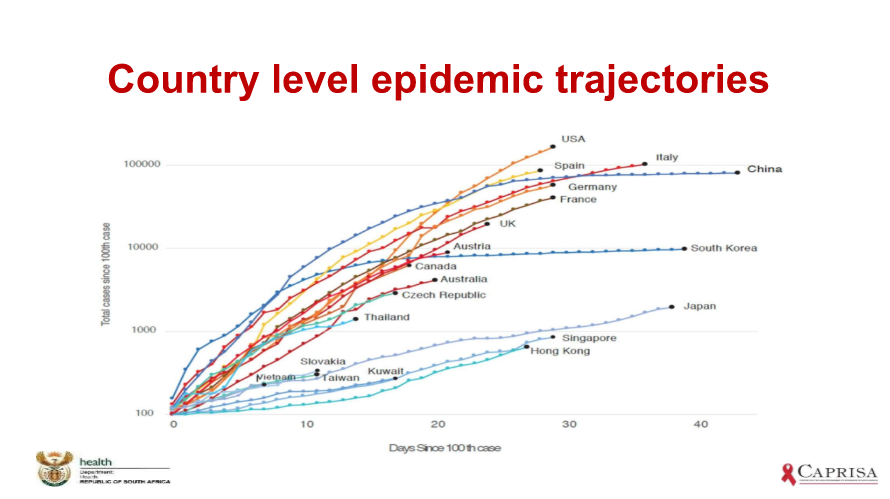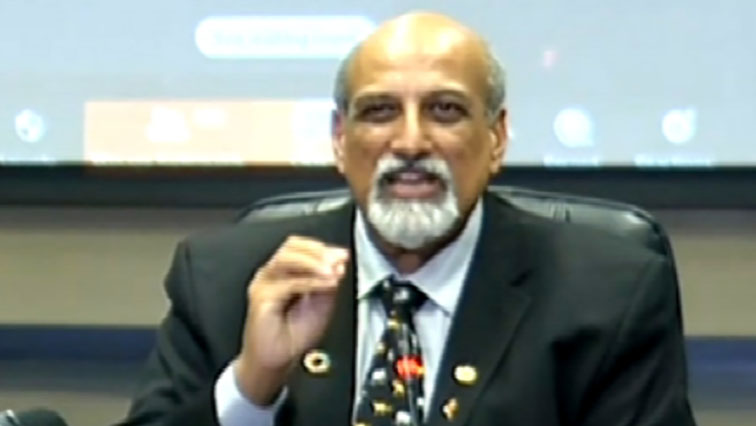Epidemiologist Professor Salim Abdool Karim says South Africa’s epidemic trajectory – related to coronavirus COVID-19 is unique compared to other countries.
Karim and Health Minister Zweli Mkhize, along with some of the country’s leading scientists and medical leaders on Monday hosted an online debate aimed at providing the latest information on COVID-19.
The latest figures show that South Africa has 2 272 positive coronavirus cases. Two more people have died, bringing the death toll to 27.
There are 2272 confirmed cases in SA and 2 more deaths in total there are 27 deaths #COVID19
— Department of Health (@HealthZA) April 13, 2020
Karim says South Africa’s current plateau in the increase of the number of positive cases can be traced back to March the 26th, the first day of the lockdown.
“So when you look at this curve, what you can see is that we were on a simple trajectory like every other country, increasing rapidly day-by-day. And suddenly on the 26th of March, it turned and started going down again. And as it went down it reached a point, somewhere around 60, 70 cases a day, and it started hovering around there.”
The graph offers data reflecting South Africa’s efforts to fight COVID-19 and projections for the future:

Government’s swift response
Professor Karim says South Africa may have missed the worst part of the coronavirus pandemic because of the government’s swift response. He says he has a reason to be optimistic.
“You have to go somewhere, get the virus, come back into your country. And when you come back, you get infected. When you do, you become the main source of the rest of the spread because the virus does not exist in our country until it’s bought in by travelers. So when they came back to our country and they started becoming clinically ill, we began to see this epidemic. But the private sector did a pretty good job and we are now seeing the tail end of that epidemic.”
Dr Zweli Mkhize holds online public engagement on efforts to fight COVID-19 in South Africa:
This is how the #LockDownSA has flattened the curve and stopped an exponential increase in #Covid19SA cases. pic.twitter.com/X9PhplYPsw
— Dr Zweli Mkhize (@DrZweliMkhize) April 13, 2020
‘COVID-19 outbreak delayed’
Mkhize says the storm the country is facing with the COVID-19 outbreak has just been delayed and has not dissipated yet. Speaking at a media briefing in Pietermaritzburg, Mkhize has thanked President Cyril Ramaphosa for his leadership in extending the lockdown period to the end of April.
Mkhize has warned South Africans not to become complacent about COVID-19.
“To defeat COVID-19 is no longer an issue of a nurse and a doctor. It is actually about society. It is actually about going in a combat zone and fighting this infection. I do want to say that at this point the indications we have, as President has indicated, are very promising. But we did say before, whilst we see some very promising elements in the response, it is still too early and therefore, if there’s any turn in the events in the outbreak, we may not have other warnings. So, I think it is important for us to keep remembering that we are still traversing through a storm that is gathering and the storm is not over.”
The graph below offers data reflecting South Africa’s efforts to fight COVID-19 and projections for the future:

Mkhize says common platform for information-sharing is going to be created. He explains that the discussions focussed on infection control protocols, as well as how beds will be made available from the private sector for public sector patients with COVID-19.
“Therefore, it’s no longer about public or private. We got to do the same thing and we have to do them properly. It was important that all the private hospitals had to adhere to standard operating procedures and also follow the clinical guidelines that are given by the NICD, which is basically our institution that guides everyone’s response in this case. Everyone is actually obliged to follow those protocols, particularly as it relates to the infection control and prevention of the spread of COVID-19.”
Mkhize says there are a number of private hospitals they are currently monitoring in KwaZulu-Natal.
In the document below, Professor Salim Abdool Karim explains the COVID-19 curve in South Africa:
Nationwide lockdown
Scientists have also warned against an abrupt and sudden end to the nationwide lockdown, saying South Africa seems to have beaten the curve in a way that no other country has.
“We know that if we end the lockdown and we end it abruptly, we may run the risk of undoing all of the effort and the benefit we’ve achieved because then we’ll be putting high risk and low risk people together travelling in the same buses, taxis, trains. We have to do something about it we have to avoid that situation. So we need to think about a plan for a systematic easing of the lockdown, starting with transport hubs and then working our way down from the lowest risk to the highest risk,” Prof Karim advised.
World under lockdown
With much of the world living in lockdown, the spread of the new coronavirus, SARS-CoV-2, that was first detected in China late last year is beginning to slow in some places. As of April 12, 1.8 million had been infected and 115 000 killed by COVID-19, the disease caused by the virus.
INFOGRAPHIC: Confirmed coronavirus cases around the world:
The health department recommends cloth masks to help contain the spread of the coronavirus. Below is an educational graphic about protective masks



